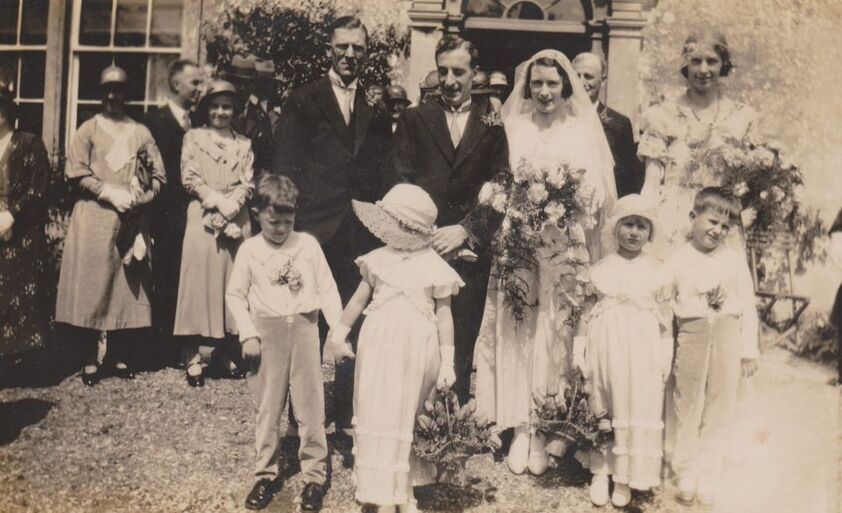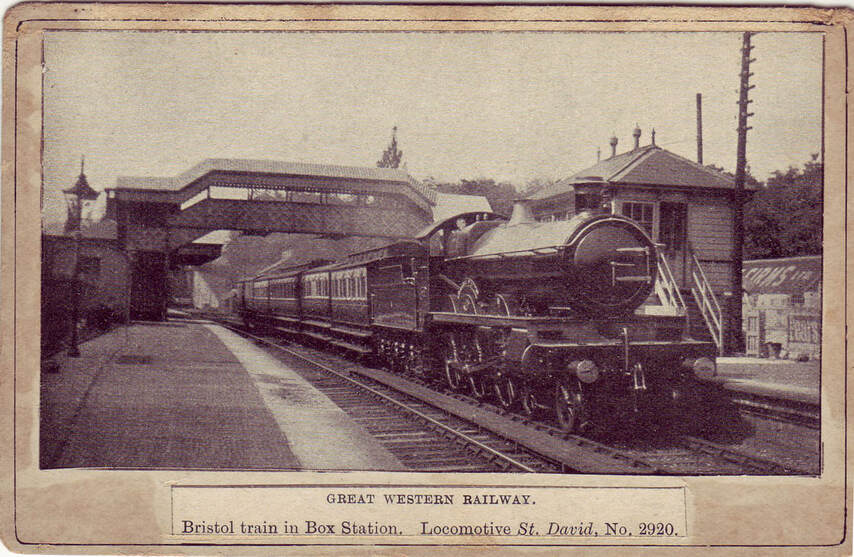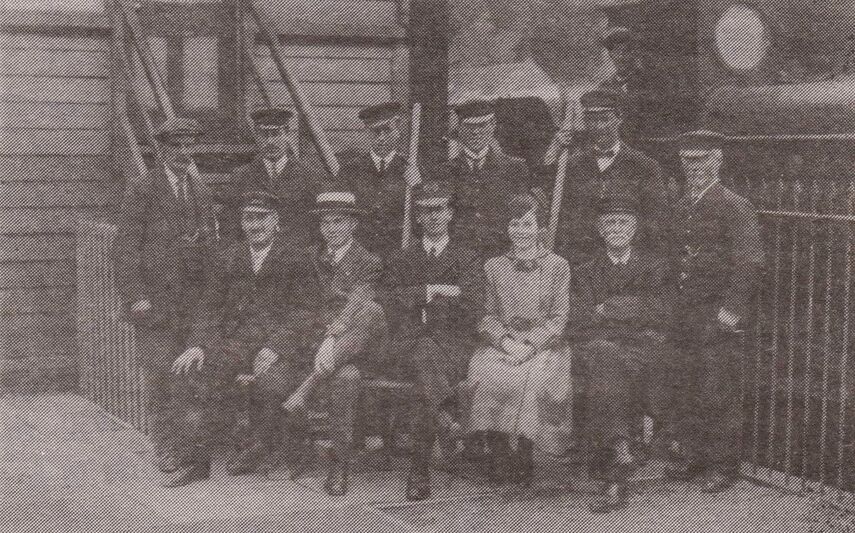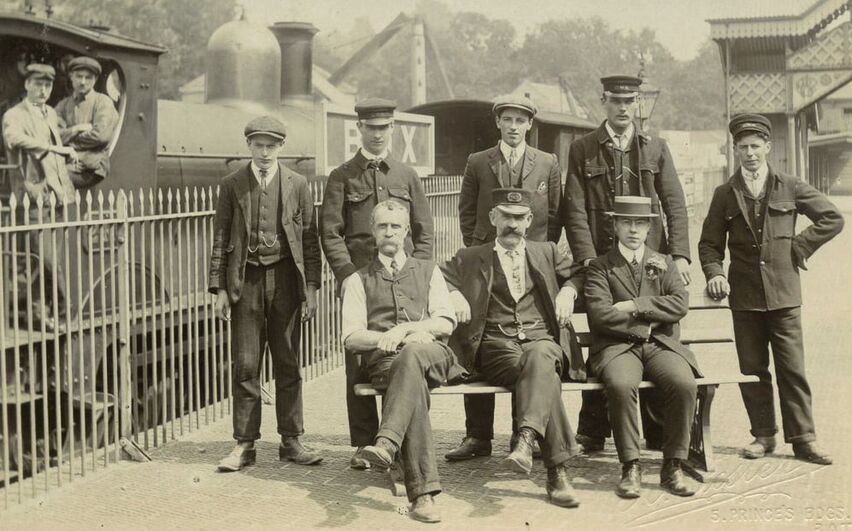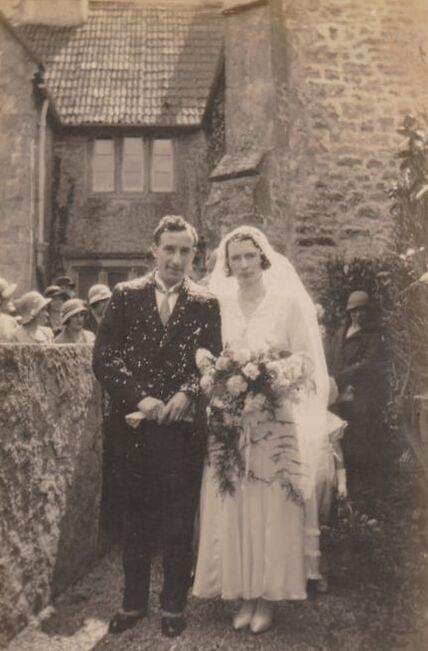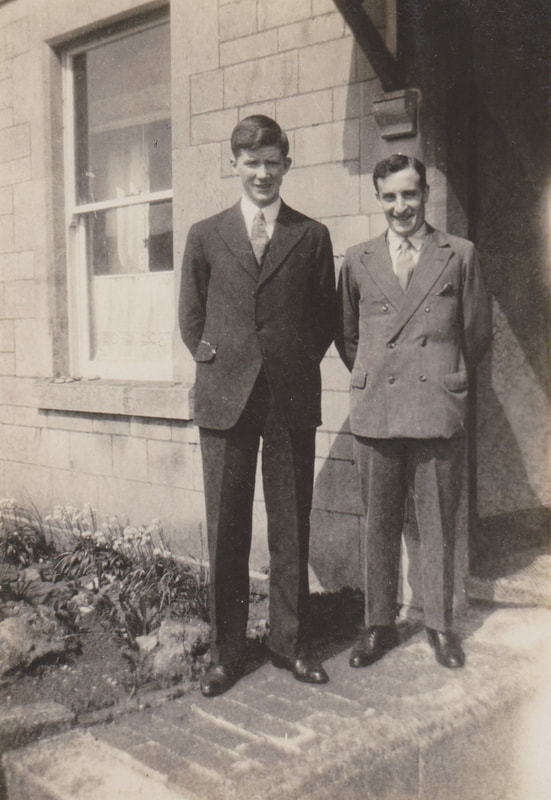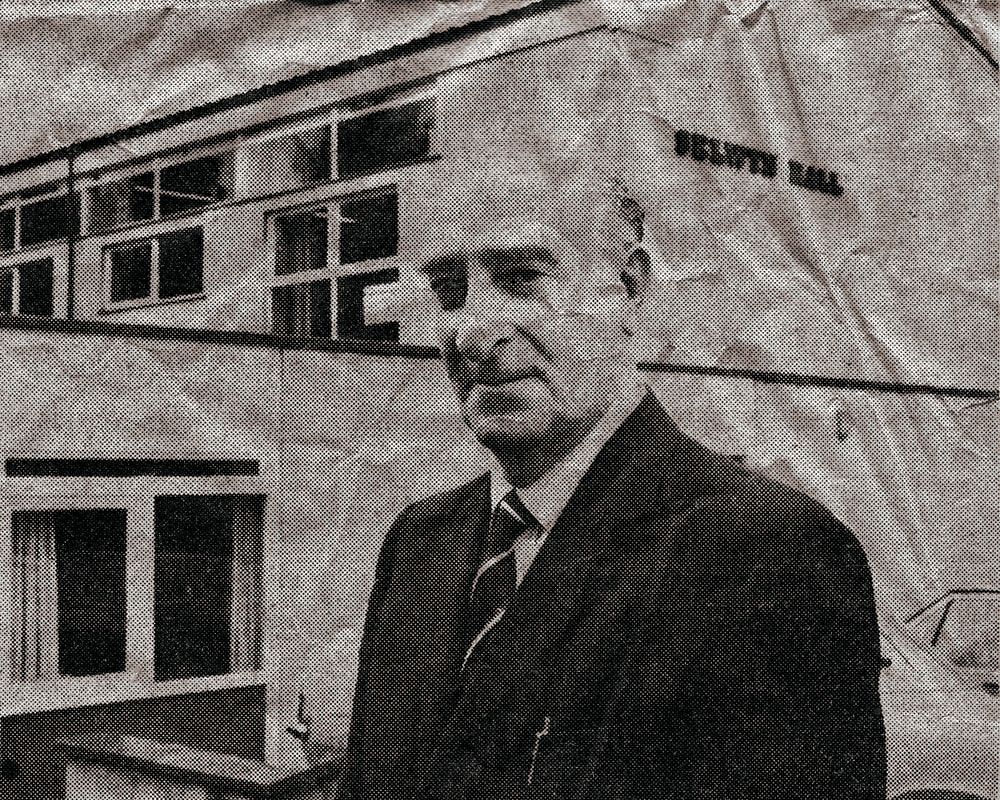Wilf Clothier, Stationmaster Alan Payne September 2023
This article is about a person who was well-known and important in his lifetime but who is in danger of falling out of memory through no fault of his own. The reason for this is that his job as Box’s Railway Stationmaster has entirely disappeared, along with those of his workmates and colleagues.
In 1926, Wilfred Clothier (31 August 1906-2002) came to Box from Castle Carey, Somerset, when he was appointed a junior railway clerk aged twenty.[1] He married his second cousin Gertrude Elizabeth Clothier (4 July 1906-1994) on 9 May 1933 at Gertie’s family home at Wyke Champflower, near Bruton, Somerset. They were related through James and Charlotte Clothier of Castle Carey, who ran a cordwainer (shoe-makers) business there. Wilf’s parents were Edwin Clothier (1866-1924), a cabinet-maker in Castle Carey, and Frances Elizabeth Adnith (16 September 1867-1943), dress-maker. Gertie’s parents were John Clothier, dairy farmer, and Ella Baker. Wilfred was a fourth son and Gertie the second of three daughters. After their marriage, they moved into a newly-built bungalow at 7 The Bassetts, which they were able to afford because Wilf had promotion prospects and a regular, steady job.
Box Railway Station
Box Railway Station was extremely busy despite being a local stop, not a national or regional hub. The reason for this was partly the need for safety in Box Tunnel and partly because of the military transport involved in the clearance of the underground quarries to make them suitable for military needs in the Second World War. Each of these special needs had to be dovetailed into the running of regular passenger and goods trains. The position of stationmaster was highly responsible. He oversaw staff, health and safety on the track and passenger security. Wilf worked for GWR for 47 years rising to the rank of stationmaster at Box Station when he succeeded Albert Frederick Wheeler in 1948.[2]. Subsequently he worked at Melksham and Holt and later he was transferred to the divisional managers’ offices at Bristol. On his retirement in 1971, he received various accolades from the railways including a gold watch.
Box Railway Station was extremely busy despite being a local stop, not a national or regional hub. The reason for this was partly the need for safety in Box Tunnel and partly because of the military transport involved in the clearance of the underground quarries to make them suitable for military needs in the Second World War. Each of these special needs had to be dovetailed into the running of regular passenger and goods trains. The position of stationmaster was highly responsible. He oversaw staff, health and safety on the track and passenger security. Wilf worked for GWR for 47 years rising to the rank of stationmaster at Box Station when he succeeded Albert Frederick Wheeler in 1948.[2]. Subsequently he worked at Melksham and Holt and later he was transferred to the divisional managers’ offices at Bristol. On his retirement in 1971, he received various accolades from the railways including a gold watch.
Eddie Weeks Remembers Box Station in the 1940s
Three of my friends and I used to be trainspotters at Box Railway Station in the mid to late 1940s. The staff at this time consisted of the stationmaster, Wilf Clothier; porters, Mr Farnfield and Sam Cannings; goods porters, Jack Dancey and Bill Robbins; and three signalmen only one of whom I can remember, Mr Cannings, whom I believe was the uncle of the porter Sam. There was also a ganger who looked after the permanent way and whose accommodation was a small hut near the water tower.
Mr Clothier did not approve of spotters on his platforms so we had to position ourselves on the approach road or at my father's stone yard. However, when the stationmaster went home and, if Sam was on duty, we had the free run of the station. We used to help him serve tickets, stick labels on parcels, load parcels onto the trolleys and light the gas lamps on the platforms. The route through Box was a good one for spotters as three trains a day were usually headed by locomotives ex works from Swindon. It was a sad day when following the Beeching axe in the 60's all traces of the station were eradicated although the coal office in the goods yard remains and is now part of the Northey Hotel.
Three of my friends and I used to be trainspotters at Box Railway Station in the mid to late 1940s. The staff at this time consisted of the stationmaster, Wilf Clothier; porters, Mr Farnfield and Sam Cannings; goods porters, Jack Dancey and Bill Robbins; and three signalmen only one of whom I can remember, Mr Cannings, whom I believe was the uncle of the porter Sam. There was also a ganger who looked after the permanent way and whose accommodation was a small hut near the water tower.
Mr Clothier did not approve of spotters on his platforms so we had to position ourselves on the approach road or at my father's stone yard. However, when the stationmaster went home and, if Sam was on duty, we had the free run of the station. We used to help him serve tickets, stick labels on parcels, load parcels onto the trolleys and light the gas lamps on the platforms. The route through Box was a good one for spotters as three trains a day were usually headed by locomotives ex works from Swindon. It was a sad day when following the Beeching axe in the 60's all traces of the station were eradicated although the coal office in the goods yard remains and is now part of the Northey Hotel.
Living in Box
One of Wilf’s best friends was Jack Tottle, who lived at 19 Fairmead View. Jack acted as best man for Wilf and took the wedding photos below. Jack and Wilf were a similar age and the both started as clerks for GWR and worked their way up the levels. In the post-war years, sport enjoyed a renaissance and both Wilf and Jack were keen badminton and tennis enthusiasts. Wilf’s prowess on the badminton court was described as: Although not tall, he had an unplayable fast serve on the tennis court and regularly enjoyed badminton in the Bingham Hall.[3]
One of Wilf’s best friends was Jack Tottle, who lived at 19 Fairmead View. Jack acted as best man for Wilf and took the wedding photos below. Jack and Wilf were a similar age and the both started as clerks for GWR and worked their way up the levels. In the post-war years, sport enjoyed a renaissance and both Wilf and Jack were keen badminton and tennis enthusiasts. Wilf’s prowess on the badminton court was described as: Although not tall, he had an unplayable fast serve on the tennis court and regularly enjoyed badminton in the Bingham Hall.[3]
Above Left: Wilf and Gertie on their wedding day in 1933 and Right: With the young Jack Tottle (both photos courtesy Margaret Wakefield)
Margaret Lambert Remembers
Wilf and his wife Gertie were very well-known figures in Box. Wilf played an active role in sports in the village, particularly the badminton club, where he was a keen player and coach. He was a sidesman at Box Church for a quarter of a century.
When Wilf and Gertie retired, they ploughed his energies into upgrading facilities in Box and they were part of the evolution of village facilities after the Second World War. Gertie served as a librarian in old Bingham Hall and they were deeply involved in the building of the Selwyn Hall, where Wilf was the treasurer for 11 years. They must have still been so proud of their achievements with the new village hall when they left Box to be closer to their family in 1981.
Wilf and his wife Gertie were very well-known figures in Box. Wilf played an active role in sports in the village, particularly the badminton club, where he was a keen player and coach. He was a sidesman at Box Church for a quarter of a century.
When Wilf and Gertie retired, they ploughed his energies into upgrading facilities in Box and they were part of the evolution of village facilities after the Second World War. Gertie served as a librarian in old Bingham Hall and they were deeply involved in the building of the Selwyn Hall, where Wilf was the treasurer for 11 years. They must have still been so proud of their achievements with the new village hall when they left Box to be closer to their family in 1981.
|
Conclusion
The role of stationmaster was a highly-venerated position in local communities. He was the point of contact for all issues, complaints, and local appointments. He was expected to deal with lost property, timetable issues and controlling passenger and goods needs. None of the railway jobs listed in this article are still in existence. Many rural stations are unmanned and larger stations are supervised by the railway manager with specific-skill executives supervising technical and timetable needs. No longer are the railways one of the main employers in Box. Wilf Clothier in 1969 outside the newly-opened Selwyn Hall (courtesy Margaret Wakefield) |
References
[1] Wiltshire Times and Chippenham News, October 1981
[2] Wiltshire Times and Trowbridge Advertiser, 19 February 1949
[3] Courtesy Anna Grayson
[1] Wiltshire Times and Chippenham News, October 1981
[2] Wiltshire Times and Trowbridge Advertiser, 19 February 1949
[3] Courtesy Anna Grayson
